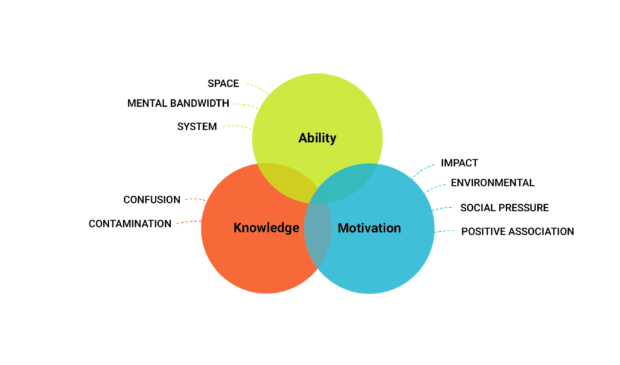Study reveals why some Austinites don’t recycle
Friday, January 20, 2017 by
Cate Malek Austin has declared that it will be a zero-waste city by 2040. But lack of progress toward that goal over the last five years has prompted the city to call in a team of researchers to better understand why Austinites don’t recycle.
The city set a goal of sending only 10 percent of its waste to landfills by 2040, but that number has plateaued at 60 percent. To find out why, members of Austin’s Design, Technology and Innovation Fellows program went into local residents’ homes to observe their recycling behaviors. They presented their findings at City Hall on Thursday night.
One of the goals of the initiative has been to make Austin a nationwide example of recycling. The slow progress is raising some concerns that other cities might say, “If Austin couldn’t even do it, well, we’re not going to even try,” said Stacy Savage, president of Zero Waste Strategies, who was in the audience to see the research results.
The team of fellows, an energetic group of four women, partnered with Austin Resource Recovery to interview 52 households over three months. Although the sample size is relatively small, the team focused on diversity, including a range of income levels, ages and neighborhoods.
They went into homes to observe recycling behavior instead of relying on self-reports, and they asked residents to talk about why they did or did not recycle. They even asked residents to draw their experiences with recycling or come up with songs that represented recycling for them. One interviewee chose “Eye of the Tiger” because recycling makes her feel empowered.
The responses to the interviews were sometimes so frank that they made the audience members laugh. It turns out that no one really knows what to do with used Keurig cups. And one interviewee, who was well-informed about recycling, said he was confused about pizza boxes.
“I can see that it’s cardboard, and it’s cardboard as hell. It’s super cardboard, but it can’t be recycled,” he said.
And it turned out that confusion over what can and can’t be recycled is one of the main challenges with getting people to recycle. The study found that single stream recycling has created “a false sense of simplicity” and has actually left many people unsure of what can go into the bin. Another finding was that recycling is often one of the first things to go for families who were under pressure because of money, young children or lack of space.
The researchers found that renters are often left without recycling facilities, or they don’t trust the multihousehold dumpsters their apartment complexes provide. “The anonymous collective dumpster makes multifamily residents feel helpless or doubtful of their impact,” the study said.
To address these concerns, the team of fellows is coming up with a series of solutions meant to increase knowledge, ability and motivation to recycle. They also plan to follow up this first research effort with a more detailed study of Austin neighborhoods and larger studies of recycling behaviors.
To read the findings of the study, visit the Austin Resource Recovery website.
Chart courtesy of the city of Austin.
The Austin Monitor’s work is made possible by donations from the community. Though our reporting covers donors from time to time, we are careful to keep business and editorial efforts separate while maintaining transparency. A complete list of donors is available here, and our code of ethics is explained here.
You're a community leader
And we’re honored you look to us for serious, in-depth news. You know a strong community needs local and dedicated watchdog reporting. We’re here for you and that won’t change. Now will you take the powerful next step and support our nonprofit news organization?






